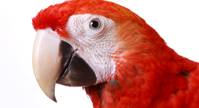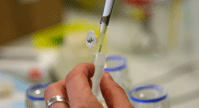Degenerative Myelopathy (DM)
Description:
 Degenerative Myelopathy (DM) is a progressive neurological disorder that affects the spinal cord of dogs. Dogs that have inherited two defective copies can experience a breakdown of the cells responsible for sending and receiving signals from the brain, resulting in neurological symptoms.
Degenerative Myelopathy (DM) is a progressive neurological disorder that affects the spinal cord of dogs. Dogs that have inherited two defective copies can experience a breakdown of the cells responsible for sending and receiving signals from the brain, resulting in neurological symptoms.
The disease often begins with an unsteady gait, and the dog may wobble when they attempt to walk. As the disease progresses, the dog's hind legs will weaken and eventually the dog will be unable to walk at all. Degenerative Myelopathy moves up the body, so if the disease is allowed to progress, the dog will eventually be unable to hold his bladder and will lose normal function in its front legs. Fortunately, there is no direct pain associated with Degenerative Myelopathy.
The onset of Degenerative Myelopathy generally occurs later in life starting at an average age of about 10-12 years. However, some dogs may begin experiencing symptoms much earlier. A percentage of dogs that have inherited two copies of the mutation will not experience symptoms at all. Thus, this disease is NOT completely penetrant, meaning that while a dog with the mutation can develop Degenerative Myelopathy, the disease does not affect every dog that has the genotype.
Sample Type:
Animal Genetics accepts buccal swab, blood, and dewclaw samples for testing. Sample collection kits are available and can be ordered at test now.
Test Is Relevant To the Following Breeds:
DM testing is relevant for all breeds, and is more prevalent in some breeds than others. Dogs of all breeds can be tested for DM, and is particularly recommended in the following breeds: Boxer, Chesapeake Bay Retriever, German Shepherd, Pembroke Welsh Corgi, Cardigan Welsh Corgi, Rhodesian Ridgeback, Poodle, Wire Fox Terrier, Labrador Retriever
Results:
Animal Genetics offers DNA testing for Degenerative Myelopathy (DM). The genetic test verifies the presence of the recessive DM mutation and presents results as one of the following:
| DM/DM | At Risk | The dog has inherited two copies of the mutated SOD1 gene and is homozygous for the mutation. The dog is at risk to develop the disorder during its lifetime. The dog will always pass a copy of the mutation to its offspring. |
| n/DM | Carrier | Both the normal and mutant copies of the gene detected. Some larger dog breeds may be at risk to develop the disorder. |
| n/n | Clear | Dog tested negative for the DM mutation and will not pass on the defective gene to its offspring. |
References:
Eur J Neurosci. 2019 Jul 23. doi: 10.1111/ejn.14526. In vitro evidence consistent with an interaction between wild type and a mutant SOD1 protein associated with canine degenerative myelopathy.
Neuroreport. 2019 Jan 2;30(1):8-13. doi: 10.1097/WNR.0000000000001151. Protein disulphide isomerase is associated with mutant SOD1 in canine degenerative myelopathy.
J Neurol Sci. 2017 Jan 15;372:369-378. doi: 10.1016/j.jns.2016.10.034. Epub 2016 Oct 24. Localization of a mutant SOD1 protein in E40K-heterozygous dogs: Implications for non-cell-autonomous pathogenesis of degenerative myelopathy.
Submit a Sample for Testing:
To submit a sample for testing please go to test now.
To
order a sample collection kit please go to order sample collection kits.
Cost per sample is $45.00. Please see our Canine Fee Schedule for all test rates.










